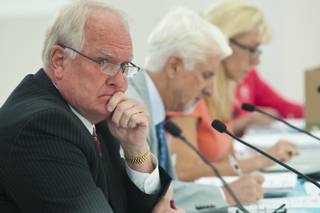Related Content
- Alistair Overeem blames failed drug test on prescribed medication
- Frank Mir gets title shot against Junior dos Santos at UFC 146
- Alistair Overeem fails drug test, makes fate of UFC 146 main event unknown
- Challenge to stabilize UFC heavyweight division awaits Junior dos Santos
- Heavyweight championship on tap for UFC 146 in Las Vegas
- UFC 141 results in Brock Lesnar’s retirement, Alistair Overeem’s rise
- Alistair Overeem granted conditional fight license after missing drug test
- UFC section
- All MMA/boxing coverage
Not only is Alistair Overeem out of UFC 146, but the heavyweight will likely miss the rest of 2012 after the Nevada State Athletic Commission turned down his request for a license Tuesday.
Overeem and his lawyer, David Chesnoff, appeared before the commission to apply for a license and explain a positive drug test that saw Overeem’s testosterone-to-epitestosterone level register more than double the 6-to-1 limit at 14-to-1. Overeem’s hope was that commission would issue a lenient ruling if he could prove he never knowingly took testosterone or intended to use performance-enhancing drugs.
That didn’t happen, although the commission did shorten the length of time until Overeem can reapply for a license. Overeem must wait nine months instead of the traditional year in similar cases because the commission sympathized with him for already pulling out of an announced heavyweight championship fight with Junior dos Santos.
“I come back to think about the overriding responsibility and burden on an applicant,” NSAC Chairman Skip Avansino said during the meeting.
“Do I believe in my heart that Mr. Overeem was taking this as an enhancement? I don’t know. But what I do know is the test reflects a 14-to-1 ratio.”
The nine months are retroactive to the date of the failed test, meaning Overeem can get relicensed as soon as Dec. 27. That could be in time for the UFC’s annual New Year’s Eve card, which Overeem headlined last year when he beat Brock Lesnar, but that’s the only possibility for him to fight this year.
Overeem declined comment to the media. Before the decision was made, Chesnoff and Overeem lobbied for a conditional license that would allow him to fight in the fall.
“Believe me when I tell you that the title fight is my dream,” Overeem told the commission. “It’s my only goal. It’s the highest level of the sport. I’ve got three other belts, which I won in Strikeforce, Dream and K-1. This was going to be the crown of my career, which I’m giving up to take a couple steps back to get back in testing and prove myself, that I’m a clean fighter.”
Not granting a conditional license wasn’t the first request from Overeem’s legal team that the commission declined Tuesday. Chesnoff originally asked for a continuance of 45 to 60 days, so he could gather more expert testimony.
After the commission was unwilling to go that route, deliberation ensued for more than two hours.
Overeem alleged that he never knew an anti-inflammatory mix for a lingering rib injury given to him by Dr. Hector Molina, who was on hand at the hearing, contained testosterone. Molina said he couldn’t remember what details he gave to Overeem on the prescription.
Molina injected Overeem with the medication two weeks after his fight with Lesnar in January and gave him a vial of the mix to use in the future. When the rib started to bother Overeem again in March, he phoned Molina, who told the fighter to inject himself in the shoulder.
Overeem provided the vial as evidence. Molina brought documents from Overeem’s visit to his Dallas office in January.
“There was no reason for Alistair to knowingly ingest this solution that contained testosterone for performance-enhancing purposes,” Chesnoff said. “If there had been some clandestine purpose for his ingestion of this material, it would not have been documented in medical records that are easily retrievable. Alistair never asked anybody not to make records of these. Alistair never asked anybody to conceal anything.”
In the end, the commission saw that as a moot point. Despite the circumstances, the commission felt it had to act on a positive drug test.
“That you would not have informed Dr. Molina that you had these conditions, and that you were going to be tested, and that you had to know what was being injected into your body and have an understanding, that surprises me very much,” Commissioner Pat Lundvall told Overeem.
Case Keefer can be reached at 948-2790 or [email protected]. Follow Case on Twitter at twitter.com/casekeefer.



Join the Discussion:
Check this out for a full explanation of our conversion to the LiveFyre commenting system and instructions on how to sign up for an account.
Full comments policy